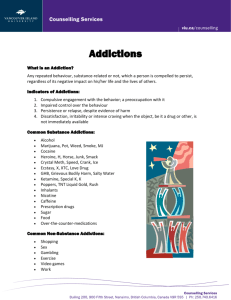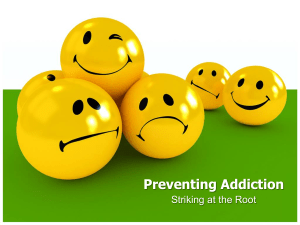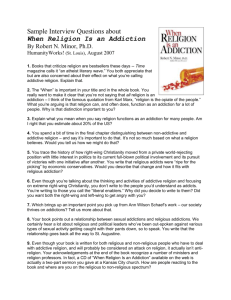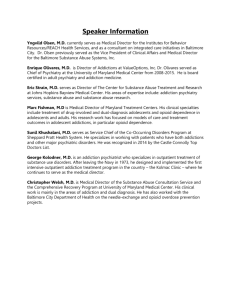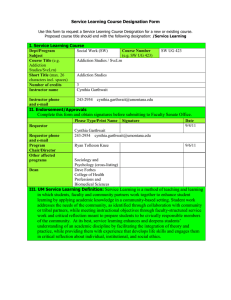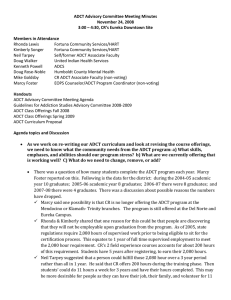Why do we need a sociology of addiction?
advertisement
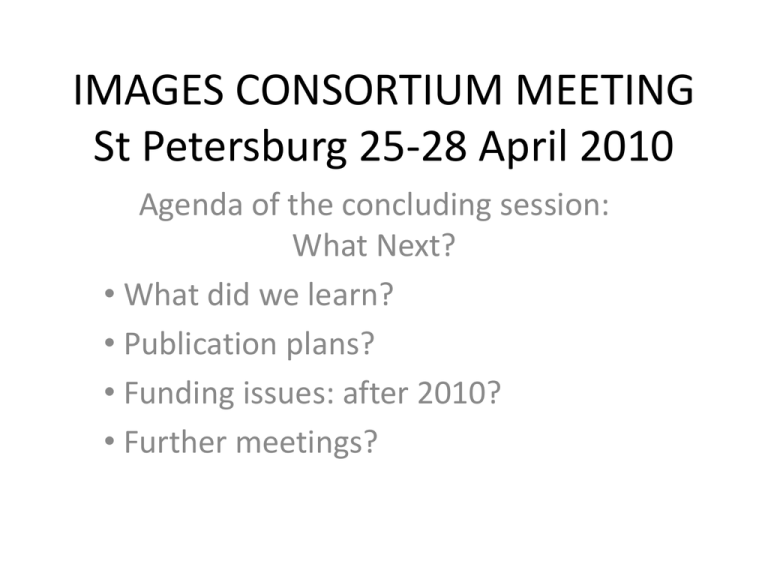
IMAGES CONSORTIUM MEETING St Petersburg 25-28 April 2010 Agenda of the concluding session: What Next? • What did we learn? • Publication plans? • Funding issues: after 2010? • Further meetings? Why do we need a sociology of addiction? What we have learned. Theories of Addiction • State of the art • Why does not brain science do the job? – Because the effects of cultural interaction (Hacking) are real (e.g. People die, go to prison, feel pain, defect babies) because of them • Why does not ordinary social constructionism (labelling, social definitions of the problem ) do the job? – because the cultural interaction effects on the addicted desire itself are also real • Why does not the public health point of view do the job? – Because addictions are not only a policy issue but a social phenomenon in a wider sense Images and representations • the Moskowici aproach • the Images approach • Sulkunen, P. Between culture and nature: intoxication in cultural studies of alcohol and drug use. Contemporary Drug Problems 29, Summer 2002 24, 7/2002. • Sulkunen, P. & Rantala, V. : Is Problem Gambling Just a Big Problem Or Also an Addiction? Addiction Res. & Theory, submitted Feb 2010. • are not contradictory but complementary – images are not representations – representations are often relevant culture culture elaborated ”us”:subjects progression ”other”: non-adult nature raw regression ”other”:non-subject rotten nature Sulkunen, P.: Images of Addiction. Representations of Addictions in Films. Addiction Res. & Theory 2007, Vol. 15 Issue 6, pp. 543-559. Representing Passions without a Name (Varpu) • A paradox • Historicity vs. production of cinematic ”effects” • The role of ”the mental moment” in production of effects on irresistible desire, fear and disgust (the abject) Difference and equality (Irina et al.) • Focus groups: substance use is part of identity construction • Agency: free will! • Autonomy contra intimacy, esp. tobacco! • Sickness vs. own responsibility, esp gambling & internet The Images Theory (Maija &…) • The imagery of ”learning”: agency, progress • (Endotactic) modalities and the issue of agency • A. Magical skills to control the game – Attribution of logic – attribution of agency • B. How to control oneself • CONCLUSION: to be a good player involves a competence (and a will) addicted behaviour involves a LEARNING process i.e. is a product of culture, which dissipates in the addiction process – In the eyes of others – In the experience of the addict The Images Theory ctd.(…Matias & …) • Different kinds of money – are different vehicles of will, competence, ability and obligation • Chance games – controlling one’s budget – controlling chance and fate (magical skills) • Skill games – in the game – managing money – CONCLUSION: the imaginary dimensions of the fascination of play are VERY diverse! But the same dissipation of their cultural articulations are most likely to take place in the addictive process The Images Theory ctd.(…& Virve) • The addict is the Other: – who is described as someone who has lost the modal quality that gives meaning to the activity – which involves a loss of agency • But it still is a complicated semiotic process which involves always a point of view Fear theory(Anja & Irina) • Familiarity reduces fear, in general (immigrants, religion, ethnicity, etc. ) • Legal OR media attention increases fear to the extent that personal experience increases rahter than decreases fear • Older people and women see substance use as a threat • Professionals less opitmistic than lay about healing in RU!!! Fear theory (Kari) • Two factor model: – A threats to security; – B social equality. All addictions belong to A! So they are frightening, rather than public health issues This is why addiction probems are not about rational planning but imaginary images; they are therefore sensitive to imaginary ”facts”, political conjunctures etc. Note: Baltica study by J Simpura. There are other surveybased studies on rank orders of social problems (ask Olli Kangas) Help Theory • Finns are afraid of substances – both lay and professionals doubt help and self-help in the case of alcohol, opiates, prescription drugs and amphetamines but not tobacco – Compulsory treatment more acceptable and number of dont know answers was higher among lay than prof • Ignorance increases stress of treatment motivation and compulsory treatment? • Urgency (motivation + compulsory) is associated with the fact that addictions are felt to be a threat to security • Lay people think that professionals should be in charge, not themselves (who are victims) • OBS! The above points towards the victims theory, which again couples it with the contradiction between autonomy and intimacy Help theory contd. • In Ru professionals are in favour of isolation of addicts, more strict than lay persons Sickness Theory (Laurence) • Heroine, cocaine, cocaine are considered dangerous; others considerably less • Still few people believe that drug free society is possible • Stereotypes: heroine users are sick, lack will and have family problems, have no place in society, are parasite, are dangerous • Insecurity is the most important problem (49%); poverty 33.6%, unemployment 32% • even strongly medicalised view of addictions does not eliminate the threat they present to society (cf. contagious diseases) The Materialist Tradition (Arto) • ”medicalisation” in the Illich/Foucault sense does not apply to early 19th c approach to alcohol • ”alcoholism” as an enitity does not apply either: causative loss of reason, a. in the etiology of different ailments, alcohol as part of materia medica • Empirical science of man since the mid 18th c.: holism, mind&body, medicine pushed into society (?), typologies of humans The Materialist Tradition contd. • Symptomatology, etiology, sense of history (civilization critique, alcohol historicized, • Trotter: drunkenness a disease, causing other diseases and a disease of the mind • Huss: availability, beliefs and customs, moral corruption; acquired desire; physical ailments; therepeutic pessimism; ”alcohol policy” • clinics, specialised institutions, heredity, bad nature, laboratory chemistry (cf. interest in the liver) The Institutional Theory: Clinical Gaze in France and Finland (Michael) • Minor quantitative differences between FR and FI • Clear difference in emphasis in what GPs say: alcoholic as a patient vs social problem • Peer help vs professional medical help • Work, friends, family as ”therapy” vs. Medical help • the psychiatric black box for both • Abstinence: no pronounced differences • longue durée? The Medical Ambivalence (Chantal) • The patients’ suffering: medical ethics concerning the GP’s role • Debate on whether we can do, but not whether we should • Policy opinions are often Hussian: availability theory, • Involuntary treatment/tutelage is a real option • Help for helpers! Training, specialists, institutions, the Police, the Legislator, Associations The Gender Aspect (Chantal) • Danger, clear awareness of the gendered consequences of alcoholism • What about other addictions?
